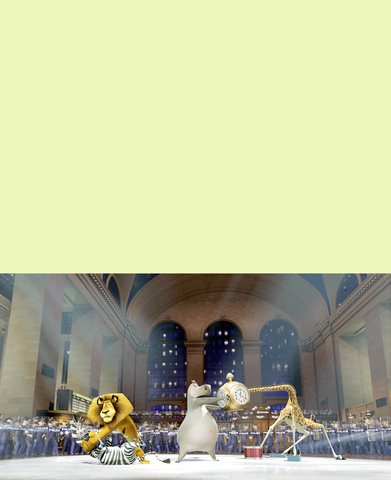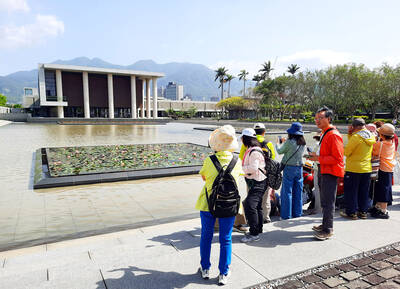Madagascar, the new computer-animated picture from DreamWorks, is, at least in part, a movie about what a bad idea it is to leave New York City. Its main characters are four residents of the Central Park Zoo -- a zebra, a hippo, a lion and a giraffe -- who abandon their lives of comfortable, pampered confinement and wind up in that strange and confusing place known as "the wild."
Of the four, only Marty, the zebra (voiced by Chris Rock), has any desire to make the trip. On his 10th birthday, in spite of a lovely party thrown by his friends, Marty finds himself in a midlife crisis, and decides to visit the open spaces and grassy savannahs of Connecticut (in whose woods, unbeknownst to him, a leopard once prowled in an older, better movie).
Tagging along with a claque of hard-boiled penguins, who have been re-enacting The Great Escape, Marty lights out for Grand Central Terminal, and his worried pals go after him, arriving at the station by subway in one of the movie's better sequences.

Then, their departure misinterpreted as a result of unhappiness with the zoo, the lot of them are shipped off to a wildlife preserve in Kenya. Instead, by accident, they land on the island that gives the film its title -- a place where, in real life, creatures like them are no more likely to be found than at the Central Park Zoo -- as well as an excuse to fill the screen with adorable, big-eyed lemurs.
The annoying sidekick is a longstanding feature of child-oriented animated entertainment. The chief innovation of Madagascar is that it consists entirely of annoying sidekicks, whose tics and quirks are not quite sufficient to make them interesting characters.
Marty's best pal is the lion, a vain, talkative cat named Alex, who speaks in the rapid-fire, passive-aggressive voice of Ben Stiller. The giraffe, a hypochondriac named Melman, is played by David Schwimmer, and Jada Pinkett Smith is the hippo, a no-nonsense, talk-to-the-hand, big sisterly type named Gloria. Julien, the king of the lemurs (Sacha Baron Cohen, of Da Ali G Show), is perhaps the most annoying character of them all, with his strange, quasi-Caribbean accent and his slinky dance moves, and even he gets a sidekick of his own (Cedric the Entertainer).

Add to this a score by Hans Zimmer, and you may find yourself longing for the quiet and relaxation of a Midtown traffic jam. Like so many other animated features -- Robots is another recent example -- Madagascar spends all its imaginative resources on visual novelty while piecing its story together out of tired conventions and loud, obvious jokes. Some of the New York scenes are both witty and grand, fusing a romantic iconography of Manhattan with incongruous animal movements in a way that makes the city feel both wild and cozy, but once the animals leave town, the movie quickly runs out of ideas.
One advantage to working with talking animals seems to be that they provide an excuse to indulge in scatological humor. Sometimes this is amusing, though the funniest example will surely sail over the heads of younger viewers: "Tom Wolfe is speaking tonight at Lincoln Center," says one sophisticated monkey to another. "Of course we're going to throw poo." On the other hand, I'm not sure why the sight of a giraffe eating a deodorant cake from a urinal is supposed to be funny, unless I'm missing the point, and it's actually supposed to be realistic.
Probably not, since the reality of life in the wild is something that this movie, like others of its kind, treats with anxious timidity. One of the apparent aims of Madagascar is to promote interspecies harmony as a metaphor for multicultural tolerance, a sweet enough idea complicated by the fact that perfectly nice animals often kill and eat one another.
Alex's regression provides the only suggestion of dramatic tension in the movie, which is otherwise smilingly innocuous, with an occasional gesture toward mild naughtiness. It has neither the wit and pathos of Chicken Run nor the emotional sweep and adventurous spirit of Finding Nemo, though it limpingly follows them for a plot point or two.
Instead, it condescends to both its audience -- who it figures will be satisfied with cuteness, flatulence, movie-star voices and bright colors -- and to its characters, about whose lives and aspirations it could hardly care less. Madagascar arouses no sense of wonder, except insofar as you wonder, as you watch it, how so much talent, technical skill and money could add up to so little.

When the South Vietnamese capital of Saigon fell to the North Vietnamese forces 50 years ago this week, it prompted a mass exodus of some 2 million people — hundreds of thousands fleeing perilously on small boats across open water to escape the communist regime. Many ultimately settled in Southern California’s Orange County in an area now known as “Little Saigon,” not far from Marine Corps Base Camp Pendleton, where the first refugees were airlifted upon reaching the US. The diaspora now also has significant populations in Virginia, Texas and Washington state, as well as in countries including France and Australia.

On April 17, Chinese Nationalist Party (KMT) Chairman Eric Chu (朱立倫) launched a bold campaign to revive and revitalize the KMT base by calling for an impromptu rally at the Taipei prosecutor’s offices to protest recent arrests of KMT recall campaigners over allegations of forgery and fraud involving signatures of dead voters. The protest had no time to apply for permits and was illegal, but that played into the sense of opposition grievance at alleged weaponization of the judiciary by the Democratic Progressive Party (DPP) to “annihilate” the opposition parties. Blamed for faltering recall campaigns and faced with a KMT chair

Article 2 of the Additional Articles of the Constitution of the Republic of China (中華民國憲法增修條文) stipulates that upon a vote of no confidence in the premier, the president can dissolve the legislature within 10 days. If the legislature is dissolved, a new legislative election must be held within 60 days, and the legislators’ terms will then be reckoned from that election. Two weeks ago Taipei Mayor Chiang Wan-an (蔣萬安) of the Chinese Nationalist Party (KMT) proposed that the legislature hold a vote of no confidence in the premier and dare the president to dissolve the legislature. The legislature is currently controlled

Dull functional structures dominate Taiwan’s cityscapes. But that’s slowly changing, thanks to talented architects and patrons with deep pockets. Since the start of the 21st century, the country has gained several alluring landmark buildings, including the two described below. NUNG CHAN MONASTERY Dharma Drum Mountain (法鼓山, DDM) is one of Taiwan’s most prominent religious organizations. Under the leadership of Buddhist Master Sheng Yen (聖嚴), who died in 2009, it developed into an international Buddhist foundation active in the spiritual, cultural and educational spheres. Since 2005, DDM’s principal base has been its sprawling hillside complex in New Taipei City’s Jinshan District (金山). But